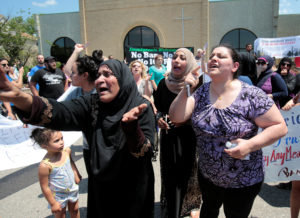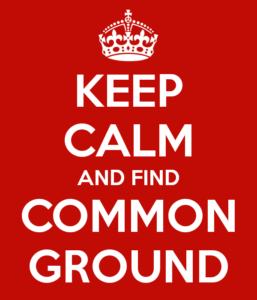Janie and Charlotte were best friends in college. They still maintain a good friendship even though Janie grew to the “Right” while Charlotte grew to the “Left” and now have some very different perspectives on politics, culture and theology. Charlotte and Janie have begun talking about their differences in a shared blog. You can find their earlier conversations here.
Charlotte:
I mentioned recently that I often hear Conservatives talk about “rule of law” and I asked you to help me understand what that means to you. I appreciate what you said in our last conversation about “rule of law” and “rule of men.” I can see we have a lot to talk about here (especially your reference to “making law from the bench…” I’m chomping at the bit to get to that one!)
But here is your statement as it concerns our topic of rule and law and immigration: “Sidestepping or ignoring the law altogether, as when immigration laws are not enforced, leads to confusion, suspicion, and cynicism…” I get this. But what about discretion when it comes to applying the law? That is and always has been common practice. How does one negotiate the grey areas?
You know my husband is an attorney so he deals with the law all the time. I serve as a CASA volunteer (Court Appointed Special Advocate) for children and I appear in court regularly to speak on behalf of my precious kid-clients who have been removed from their homes.  Here in my little county in northeast Texas, I am proud to count the chief of police, sheriff, judges and prosecuting attorneys as personal friends; most are classic rule-of-law Conservatives and I respect them and trust them.
Here in my little county in northeast Texas, I am proud to count the chief of police, sheriff, judges and prosecuting attorneys as personal friends; most are classic rule-of-law Conservatives and I respect them and trust them.
All the Liberals I know are conscientious, law abiding citizens. Many of us Liberals see clearly the devastation of crime and want to live in a safe and ordered society. No Liberal I know wants open borders. So I wonder why it feels like Liberals and Conservatives are so far apart in this discussion. Why do I feel like Conservative “rule of law” folks have trouble balancing rules and grace?
Believing in and abiding by the rule of law does not negate our human responsibility to act compassionately toward others. Supporting the rule of law in our society can advocate for equitable sentences and rehabilitation – not simply impose retribution. I’ve been encouraged by some bi-partisan efforts to reform our criminal justice system and was sorely disappointed to see this current attorney general revert to discredited, hard line approaches to punishments. Such harsh applications of the rule of law will never improve the lives of real people who have made mistakes and are willing to do the work to turn their lives around.
So now, back to our topic of immigration and the rule of law. It is widely known that President Obama directed ICE officials to use discretion when taking undocumented persons into custody. The current president has reversed this approach and has unleashed (what I call) “bullies with badges” on hard working people and their fragile families. There are too many real-life stories about the chaos this tactic is causing; every day it seems another heartrending story comes out. I mention only two.
Here is one: a father on his way to the hospital to pick up his newborn son was arrested by ICE agents. What will this young mother and her children do now?
Here is the other story I know you have criticized yourself: Iraqi immigrants, mostly Christians, are being targeted for deportation in several communities.
From the article: “It’s not clear why the removal orders fall mostly on the Christian community, though they appear to stem from an agreement between President Donald Trump and Prime Minister Haider al-Abadi, with Abadi for the first time agreeing to waive travel documents so Iraqis could be deported from the United States to Iraq.

In exchange, the president dropped Iraq from the list of predominantly Muslim countries where immigration to the United States was suspended…”
(Here is another article from the conservative National Review about the Iraqi Christians: “Enforcing current immigration law is not a justification for inhumanity, and there is no other description for sending a group of men and women almost certainly to their deaths…”)
Bullies with badges, under the direction of this current president, are applying a rule of law toward the most vulnerable among us without wisdom, discretion or compassion; this is inhumane. It is also un-American. (By the way, where is the Conservative outrage against the businesses and corporations that thumb their nose at the rule of law by hiring undocumented residents in the first place? There’s another conversation for us.)
I am not alone in voicing my concerns about how the current administration is using – and misusing – the rule of law concept. Read here an article about the Republican Supreme Court Chief Justice in California who used her annual State of the Judiciary address to argue that the administration’s immigration crackdown is actually challenging the rule of law.
So my question rephrased: Is there room for grace within the Conservative understanding of “rule of law”? And my second question for you as a fellow Christian, how does your faith inform your political beliefs on this issue of rule of law and immigration?
Janie:
Of course there is room for grace within the conservative understanding—you just cited two conservative sources (National Review and World magazine) in defense of your argument. And as you mentioned, I already agree with you about the Iraqi Christians, and I agree with you about many overreaches by ICE and other federal agencies regarding non-citizens.
Grace doesn’t override the law—the law defines grace. Without law there would be no grace. What I mean by “rule of law,” and what I assume many Conservatives more thoughtful and knowledgeable than I mean, is that the law must remain as a standard even when tempered by mercy. A good judge will consider motives and extenuating circumstances when handing out sentences, but the crime must be acknowledged. Even in the Old Testament, “the age of law,” mercy was the law’s constant companion. And in the New Testament “reign of grace,” Jesus reinforced the importance of obeying the law and that “to whom much is given, much will be required.”
Bending the law in order to extend mercy does not destroy the law. Sidestepping or overriding the law for political or material advantage does destroy it, or at least severely weaken it until it doesn’t mean much. And we see that on both sides: Democrats want votes, Republicans want cheap labor. Americans all along the political spectrum hire undocumented workers and pay them under the table. Disregard for the Rule of Law has got us into this situation, where hastily-written, opportunistic rules override Constitutional law. I call it the “power of attorneys” (meaning no disrespect to your husband!).
President Obama caused a flap in 2014 when he issued an executive order that basically extended amnesty to about four million immigrants who were here illegally. The order didn’t stand up to court review, but President Trump’s more recent travel ban did. It was determined that, constitutionally, a president does not have the power to do what Obama did, but he does have the power, in the case of hostile or threatening nations, to do what Trump did. That doesn’t mean that Trump was right—the first order was ill-conceived and way too hasty, and the second one a little better. But the basic idea, of suspending travel from certain problematic countries for 90 days while reviewing current policies, seems reasonable enough.
I would like to see all our current policies reviewed and brought in line with a much more orderly process. Not just for the sake of American citizens, but also for the sake of prospective immigrants in other countries who are receiving mixed messages. Basic immigration policy should not swing wildly with every new administration. As I said before, I’m willing to compromise—general amnesty for those already here (not counting criminals) in return for border security and better vetting practices such as E-verify. (Many, many conservatives are in favor of that—I’m not sure which conservatives are “thumbing their noses” at hiring undocumented residents, unless they own farms or factories, and in that case the nose-thumbing would apply to liberal owners as well.)
If we could come to some agreement about what immigration law should be, and what the threat of unrestricted immigration actually is, that might be a start. Peter Beinhart, an unabashed progressive, takes his political peers to task for not recognizing the issues in this Atlantic article. If I answered your questions about rule of law, might this be a place to go next?
Charlotte:
I just read this Atlantic article last week and was planning to send it to you! So yes, I think Beinhart’s critiques would be a good conversation piece. I want especially to hear more about your thinking on the topic of assimilation.
In the wrap up in our other conversation on immigration, you said this: “What some of us fear—and actually this is not a great fear of mine, but I can see why it’s a matter of concern—is allowing in more immigrants, ‘legal’ and not so much, who do not subscribe to American ideas and want to change it to something else.”
In Peter Beinhart’s article, The Democrats Immigration Mistake, he says this: “Promoting assimilation need not mean expecting immigrants to abandon their culture. But it does mean breaking down the barriers that segregate them from the native-born. And it means celebrating America’s diversity less, and its unity more.”
Beinhart’s comment makes sense to me. I “preach” quite a bit about unity in diversity. (Here’s a recent blog.) But I wonder what you mean when you say Conservatives fear that immigrants are trying to change America to “something else.”
Something that really concerns me is how the current climate in America is fraught with such vitriol and violence and, I have to say, many of the ugly anecdotal stories we hear are coming from the Right. Too many closet haters now feel permission to act out against any who do not look like the stereotypical white Christian. Why does diversity cause such fear and anger in people? And how is unity possible when there is a fundamental rejection of our inherent diversity?
As I said at the outset:  I believe Liberals and Conservatives can find much common ground in this discussion and I think yours and my efforts at this back-and-forth/give-and-take are demonstrating this reality. But where are the other calm, reasonable conservative voices? How can you help us progressives find more Compassionate Conservatives like you who can be our conversation partners?
I believe Liberals and Conservatives can find much common ground in this discussion and I think yours and my efforts at this back-and-forth/give-and-take are demonstrating this reality. But where are the other calm, reasonable conservative voices? How can you help us progressives find more Compassionate Conservatives like you who can be our conversation partners?
Anyway, yes, let’s talk about Peter Beinhart’s ideas in The Atlantic article. You start.
Janie:
Okay—back atcha soon.
Janie B. Cheaney blogs at Gobsmacked by Life … sometimes

Janie has published six novels for teens. Her historical fiction is especially well done with solid research, engaging characters and great writing. Janie’s J.B.Cheaney Facebook page is a fun and helpful author resource.
 Charlotte Vaughan Coyle lives in Paris TX and blogs about intersections of faith, culture and politics on her website and Intersections Facebook page. She is national secretary for Coffee Party USA and contributes regularly to the Join the Coffee Party Movement Facebook page.
Charlotte Vaughan Coyle lives in Paris TX and blogs about intersections of faith, culture and politics on her website and Intersections Facebook page. She is national secretary for Coffee Party USA and contributes regularly to the Join the Coffee Party Movement Facebook page.
Charlotte is an ordained minister within the Christian Church (Disciples of Christ) and also blogs about Scripture from a progressive Christian approach in her Living in The Story Musings.
Photo Credit: A group of women react as they talk about family members seized by Immigration and Customs Enforcement agents during a rally outside the Mother of God Catholic Chaldean church in Southfield, Michigan, U.S., June 12, 2017. REUTERS/Rebecca Cook